
“When I was 5 years old, my mother always told me that happiness was the key to life. When I went to school, they asked me what I wanted to be when I grew up. I wrote down ‘happy’. They told me I didn’t understand the assignment, and I told them they didn’t understand life.” ~ John Lennon
Cultivate Happiness as a Habit
How would you like to make happiness a daily habit instead of letting it be a product of chance? For many of us, happiness is a result of some external circumstance, but it doesn’t have to be.
The 17 methods listed below will put the power back in your hands.
They will give you the means to choose happiness when and where you want. The best part is that all of them are validated by the expertise of psychologists, neuroscientists or experts in the field of developing the human potential. Every single method has been tried, tested and proven to produce the results you are looking for.
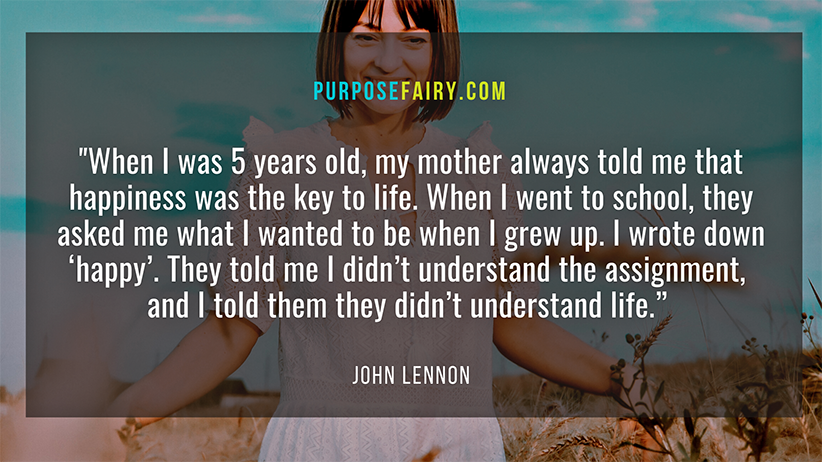
17 Surprising Ways to Cultivate Happiness as a Habit
So, are you ready to cultivate joy into your everyday life and turn happiness into a habit?
Here are 17 surprising ways you too can cultivate happiness as a habit live the life you’ve always wanted to live: a happy and peaceful one.
1. Cultivate happiness by setting preemptive strikes
Preemptive strikes are clear plans on when and where you will execute a certain action. Studies have shown that when a person sets a preemptive strike in preparation for the desired action, they are more likely to take the action.
A group of elderly patients in Scotland that used preemptive strikes while recovering from hip or knee surgery began walking twice as fast as patients that did not.
Whatever actions bring you joy and drive your life forward, create clear plans with very specific instructions to your brain on when and where you intend to engage in those actions.
Set preemptive strikes for all the habits you want to ingrain in your life and you will accelerate your goals faster than you ever thought possible.
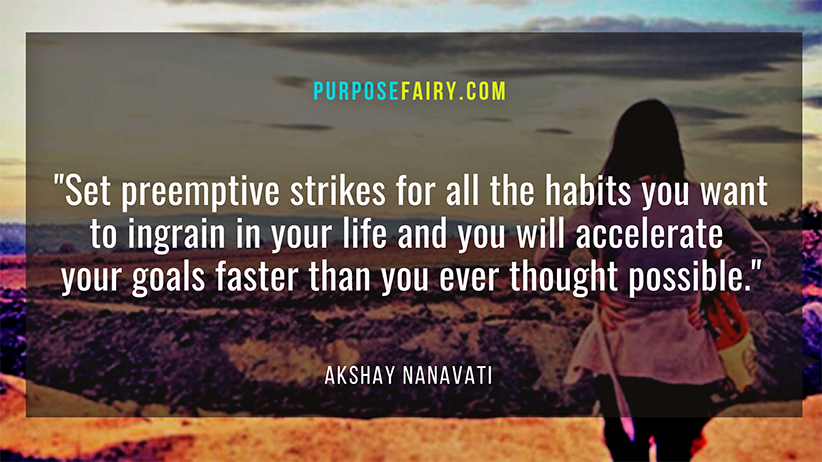
2. Cultivate happiness as a habit by welcoming fear
Fear is not your enemy. As long as you keep growing and taking steps outside your comfort zone, it is only natural to experience fear.
In my 28 years, I have spent 7 months in a war zone with the US Marines, climbed mountains in the Himalayas, scuba dived into underwater caves, jumped out of airplanes, quit a well-paying full-time job to spend $15,000 skiing across the second largest icecap in the world, and started two companies. The one common element in all those experiences was fear.
Of fear, Nelson Mandela said,
“I learned that courage was not the absence of fear, but the triumph over it. The brave man is not he who does not feel afraid, but he who conquers that fear.” ~ Nelson Mandela
And why is courage important?
Because as C.S. Lewis once said
“Courage is not simply one of the virtues, but the form of every virtue at the testing point.” ~ C.S. Lewis
The more you welcome fear, the more you build your muscle of courage and in turn find growth in all other virtues.
Do things that scare you. Push yourself until the butterflies in your stomach go wild. Each step beyond your comfort zone will reveal to you the infinite possibilities that live on the other side of fear. You simply have to take the leap to experience them.
3. Cultivate happiness by accepting your negativity
All human beings are born with what psychologists call “the negativity bias.” It is an evolutionary construct that has kept us alive as a species. That is why we naturally focus on what we don’t have in life, not what we do. Accepting that we have a negativity bias normalizes those moments when we are negative.
The problem that most of us go through is not just being negative, it’s the judgment we have about ourselves for being that way. Many of us hold on to big sticks that we beat ourselves up with for not being perfect. But now that you know we are evolutionarily conditioned toward the negative, you can let go of that stick.
This is not to say that we are stuck in a negative space for the rest of our lives. Many of the methods mentioned below will help condition the negativity out of our brains, but this awareness helps normalize those moments when we find our minds wandering toward the negative.
4. Cultivate happiness through the power of appreciation
I used to hate going into New York City. Crowded areas, tall buildings, busy streets, it all scared me. Probably a side effect from my experience in Iraq. But I found a way to love it.
Every time I go into the city, I practiced appreciating everything and everyone. I told myself things like “wow! It must have taken so much hard work to build these buildings,” or “I really appreciate all the people that planned out, organized and built these streets.”
By appreciating everything everywhere, I turned things I hated into things I enjoyed.
5. Cultivate happiness by anchoring joy
Anchoring an emotion allows you to experience it at will. To anchor in joy, look back into your past and recall a positive memory. Really feel the emotion of happiness and joy that you experienced during that event. While you are in that state, imagine a circle in front of you.
What color is the circle?
What size is it?
Visualize all the details of the circle and then step into it. Let that circle be your circle of joy.
Your brain will start to form a pathway in your brain that connects the circle to pleasure, so that any time you want, anywhere you want, all you have to do is picture the circle, step into it and you will create joy.
6. Cultivate happiness through smiling
Psychologist Robert Zajonc and numerous other researchers since have proven that the act of smiling leads to the emotion of happiness. Smiling is then not just a side effect of happiness, it causes it as well.
It has even been shown to reduce stress and depression.
So the next time you are feeling the blues, just smile and force your mind to respond with happiness.
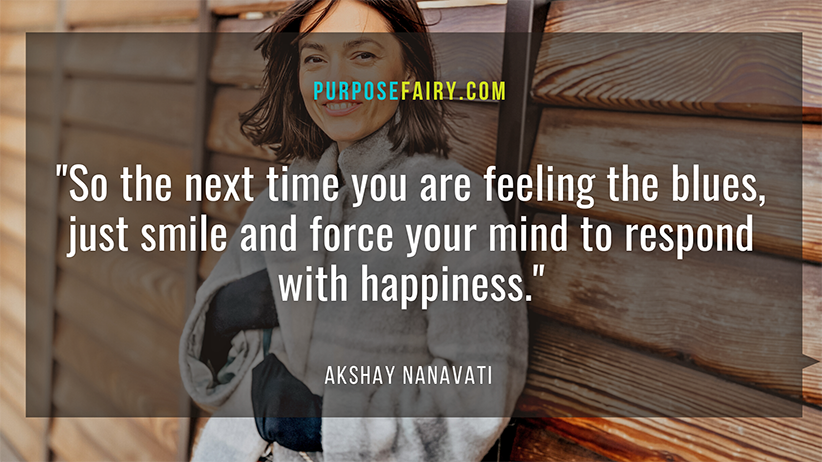
7. Cultivate happiness by breathing properly
Taking long, slow breaths calm down the nervous system and creates a physiological change in your body.
If you find yourself hijacked by fear, stress or anxiety, pause, breathe in for four seconds, and out for four seconds. You will immediately find yourself shifting into a place of peace, comfort, and happiness.
8. Cultivate happiness through daydream
The mind cannot distinguish between something that is vividly imagined and something that is real.
In their quest for mastery, Russian gymnasts have found that the optimal level of training was 25% physical and 75% mental. Most of their preparation time for the Olympics was devoted to daydreaming images of them performing their routine and winning the gold.
From Russian gymnasts to Michael Phelps to personal development Guru’s like Jack Canfield, they all use the power of mental imagery to produce results in their lives.
If you want to be happier, just go into your mind and dream of the place that brings you joy. Plant that feeling into your body and take action in service of bridging the gap between the internal reality and the external one.
9. Cultivate happiness through stillness
Jack Canfield, the bestselling author of the Chicken Soup for the Soul series and the Success Principles, credits meditation to be the number one strategy responsible for his success.
Science too validates its power:
In his research, neuroscientist Dr. Andrew Newberg scanned the brains of chanting Sikhs, meditating Buddhists and praying nuns. He found that they had an increase in activity in the areas of the brain associated with focus and awareness. These are the parts of the brain that give us the power to choose our destiny instead of being victimized by external circumstances.
Every day, for just 12 minutes, close your eyes, remove all distractions and sit in stillness. Breathe in and out slowly. Focus your mind on your breathing. Your breath acts like an anchor for your mind to come back to when it wanders. And it will, especially at first. But that’s okay. In time you will be able to sit in stillness with your mind.
In just eight weeks of practicing this meditation every day, Dr. Newberg found that a group of elderly participants in his study had noticeable changes in their brain activity and experienced an improvement in memory as well.
10. Cultivate happiness by seeking refuge
All of us have an innate need to be secure and comfortable. We want to know that the world is not going to fall apart around us. This is built in us right from the very first time our parents hold us in their arms.
But the world is not always a safe and secure place to be. Evolutionary constructs like the negativity bias only make it worse, because they have us create dangers even if no real ones exist.
Ever imagined the worst-case scenario to be much worse than it actually is? That’s the negativity bias in action.
To create a safe space for us to go back too, regardless of the state of the world around us, all we have to do is seek refuge in our minds.
Go to a place where you feel secure. Say the words out loud “I find refuge in…” Sense the comfort and security from that refuge throughout your body.
Neuroscientist Dr. Rick Hanson says
“Taking refuge pulls you away from reactivating situations and concerns, and then fills you with positive influences. As you rest increasingly in a background sense of refuge, neurons are quietly stitching a safety net for you.” ~ Dr. Rick Hanson
11. Cultivate happiness as a habit by exercising
Richard Branson attributes exercise to be the number one factor contributing to his productivity. And he runs a multibillion-dollar empire. Pushing your body to its limits and beyond increases confidence and improves the overall quality of life.
James Prochaska, a researcher at the University of Rhode Island says,
“Exercise spills over. There’s something about it that makes other good habits easier.” ~ James Prochaska
For at least three days a week, do something that pushes you physically and you will experience greater joy in all areas of your life.
12. Cultivate happiness by finding happy people
Jim Rohn once said, “You are the average of the five people you spend the most time with.”
If you want to be happier, start spending more time with happy people. Emotions are infectious. Dr. Oberman and Dr. Ramachandran have shown that networks in our brain associated with certain actions activate when we see others engaging in those actions, even if we are sitting still.
Similarly, they are activated in response to the emotions of others as well. Psychologists refer to the neurons that create this phenomenon as “mirror neurons.”
What that means is that the more time you spend around people who exemplify the life you want to lead, the easier it will be to create that life. Your body and mind will naturally begin to mirror the people you spend the most time with.
13. Cultivate happiness by erasing unhappy vocabulary
Tony Robbins says,
“Simply by changing your habitual vocabulary – the words you consistently use to describe the emotions in your life – you can instantly change how you think, feel and how you live.” ~ Tony Robbins
Replace words like depression from your vocabulary with words like joy and you will make happiness a regular habit.
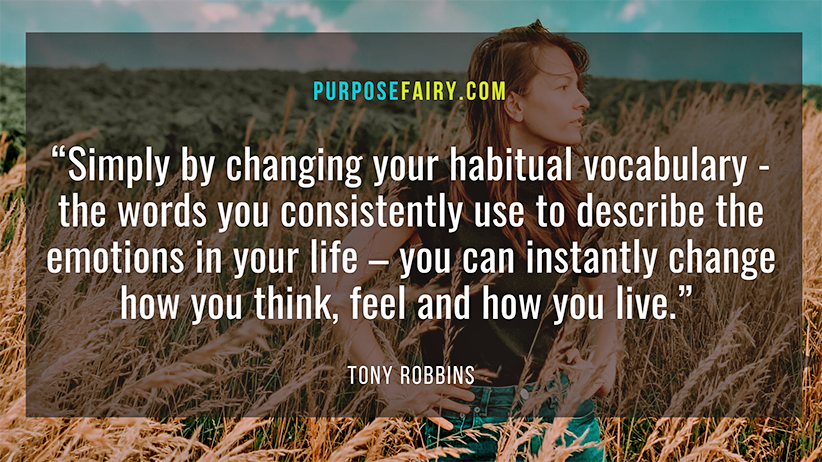
14. Cultivate happiness as a habit by labeling your emotions
In his research, neuroscientist Dr. Lieberman discovered that the act of assigning a label to an emotion reduces its impact. It lessens activity in the emotional parts of the brain and increases activity in the parts of the brain associated with focus and awareness.
The next time you find yourself in a disempowered state, assign a label to the emotion to separate yourself from the experience. This will allow you to be proactive about the emotions you choose as opposed to being at the effect of external circumstances and letting them dictate your emotions.
15. Cultivate happiness by giving new meanings to your experiences
Every experience in life has no inherent meaning to it. We assign meanings to our experiences and those meanings shape our quality of life.
The psychiatrist Victor Frankl found an empowering meaning to life even while imprisoned in a concentration camp during the Holocaust. In his bestselling book, Man’s Search for Meaning, he writes
“Everything can be taken from a man but one thing: the last of human freedoms – to choose one’s attitude in any given set of circumstances, to choose one’s own way.” ~ Victor Frankl
We always get to choose the meaning we associate an experience and the impact it has on us.
If you go through an experience that puts you in a disempowered state, follow the previous step by labeling the emotion you experiencing and then ask yourself what else can you make it mean.
If you struggle to come up with a new meaning, spend a few minutes in your circle of joy or travel into the future to your ideal lifestyle. From that place, then ask yourself, what else can I make this mean?
You will surprise yourself by what you come up with.
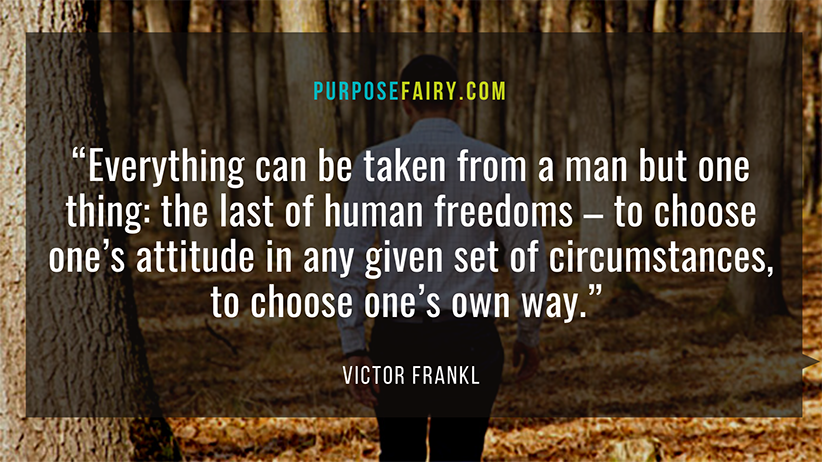
16. Cultivate happiness by time-traveling
Researchers have found that every time you recall a memory, it changes. You are essentially recalling the last time you remembered that memory, not the memory itself. As such, whatever you are going through in the present moment of recall alters the structure of the memory.
In her work, cognitive psychologist Elizabeth Loftus has demonstrated that memories are easily distorted and it is surprisingly simple to even implant false memories.
If repeatedly practiced, you have the power to travel back in time and alter unhappy memories by creating new neurological pathways in your brain.
Put yourself in a happy state by using some of the other methods mentioned in this post. Then recall the memory, but change the contents of it. Imagine that something else happened, something other than what actually happened. Keep doing this while anchored into a very positive state and in time you will literally change the memory into a happy one.
17. Cultivate happiness as a habit by challenging yourself
In the bestselling book, Flow: The Psychology of Optimal Experience, after decades of research Mihaly Csikszentmihalyi found that what ultimately produces the most joy in people is the state of Flow. Of this state, he says,
“The best moments usually occur when a person’s body or mind is stretched to its limits in a voluntary effort to accomplish something difficult and worthwhile.” ~ Mihaly Csikszentmihalyi
If you look back at your life today, what are the moments you treasure the most? Usually, that answer falls into one of two categories, a relationship or an accomplishment.
For me I am most proud of the time I served in the Marines, the mountains I have climbed, the businesses I have started and the one-month I spent dragging a 190-pound sled 350 miles across the second largest icecap in the world. All of those experiences involved pushing my mind and body to its limits.
The more you challenge yourself and do what you once thought was impossible, the greater levels of joy, freedom, and accomplishment you will experience in your life.

How often do you feel really happy? Do you think happiness is a goal? You can share your insights by joining the conversation in the comment section below
Comments
Akshay Nanavati
As an adventurer, Marine Corps veteran, speaker and successful online entrepreneur, Akshay Nanavati has dedicated his life to exploring the limits of the human potential.To learn more about Akshay, visit www.existing2living.com
read more